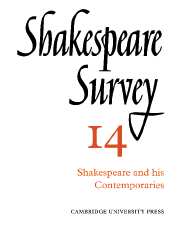Book contents
- Frontmatter
- Studies in Elizabethan and Jacobean Drama since 1900
- Shakespeare and Lyly
- Shakespeare and Mundy
- Marlowe as Provocative Agent in Shakespeare’s Early Plays
- The Tragedy of Revenge in Shakespeare and Webster
- The Simplicity of Thomas Heywood
- The Tragic Vision of Fulke Greville
- Shakespeare v. The Rest: The Old Controversy
- Shakespeare’s Gentleness
- Milton on Shakespeare
- An Unrecorded Elizabethan Performance of Titus Andronicus
- Stratford-upon-Avon a Hundred Years Ago
- International Notes
- Shakespeare Productions in the United Kingdom: 1959
- Three Directors: a Review of Recent Productions
- The Year's Contributions to Shakespearian Study 1 Critical Studies
- 2 Shakespeare’s Life, Times and Stage
- 3 Textual Studies
- Books Received
- Index
- Plate section
3 - Textual Studies
Published online by Cambridge University Press: 28 March 2007
- Frontmatter
- Studies in Elizabethan and Jacobean Drama since 1900
- Shakespeare and Lyly
- Shakespeare and Mundy
- Marlowe as Provocative Agent in Shakespeare’s Early Plays
- The Tragedy of Revenge in Shakespeare and Webster
- The Simplicity of Thomas Heywood
- The Tragic Vision of Fulke Greville
- Shakespeare v. The Rest: The Old Controversy
- Shakespeare’s Gentleness
- Milton on Shakespeare
- An Unrecorded Elizabethan Performance of Titus Andronicus
- Stratford-upon-Avon a Hundred Years Ago
- International Notes
- Shakespeare Productions in the United Kingdom: 1959
- Three Directors: a Review of Recent Productions
- The Year's Contributions to Shakespearian Study 1 Critical Studies
- 2 Shakespeare’s Life, Times and Stage
- 3 Textual Studies
- Books Received
- Index
- Plate section
Summary
There has never been a time, even during the war against Walker by Tonson and the rest of the Proprietors, when Shakespeare was so frequently published or widely read. There would seem to be an edition to suit every purse and every taste. Yet never have editors been so self-critical. A sort of revolution began in 1921, with the statement of principles by the editors of the first volume of the New Cambridge Shakespeare. Sixteen years later, the first of the Penguin paperbacks came from press with an easy text and minimal apparatus. Upon the completion of the last Penguin, the editor still bristles at the mention of ‘scientific bibliography’, which he seems to equate with the palaeographical attack upon textual problems. Meanwhile, many school texts continued to reprint the Globe text, with or without modification, and scholars began to debate the theory of editing. McKerrow’s Prolegomena led to Greg’s Editorial Problem, which was followed by essays and monographs on special problems. Peter Alexander’s independent text was followed by C. J. Sisson’s, and that in turn by John Munro’s. The New Arden volumes, in which special editors are given wide leeway, have raised again the question of modernized punctuation and spelling and—by contrast with the new severely scholarly edition of Dekker—have confronted publishers and reviewers with the problem of what to give the serious reader. It is not without significance that in the land where variorum editions are supposed to be anathema, the New Arden retains many variorum features.
- Type
- Chapter
- Information
- Shakespeare Survey , pp. 157 - 166Publisher: Cambridge University PressPrint publication year: 1961

